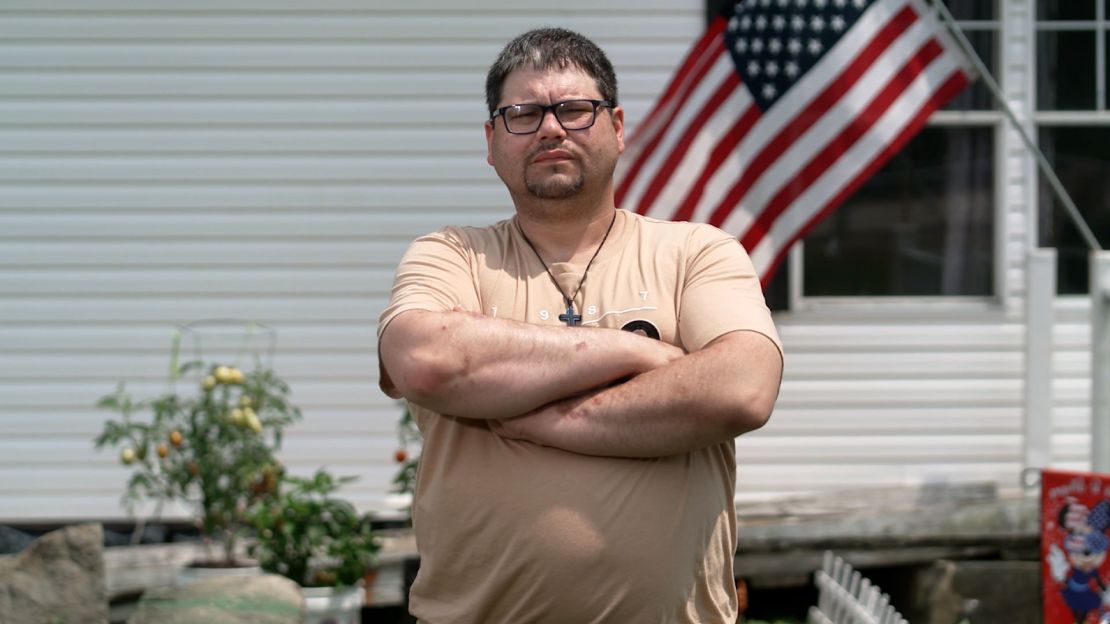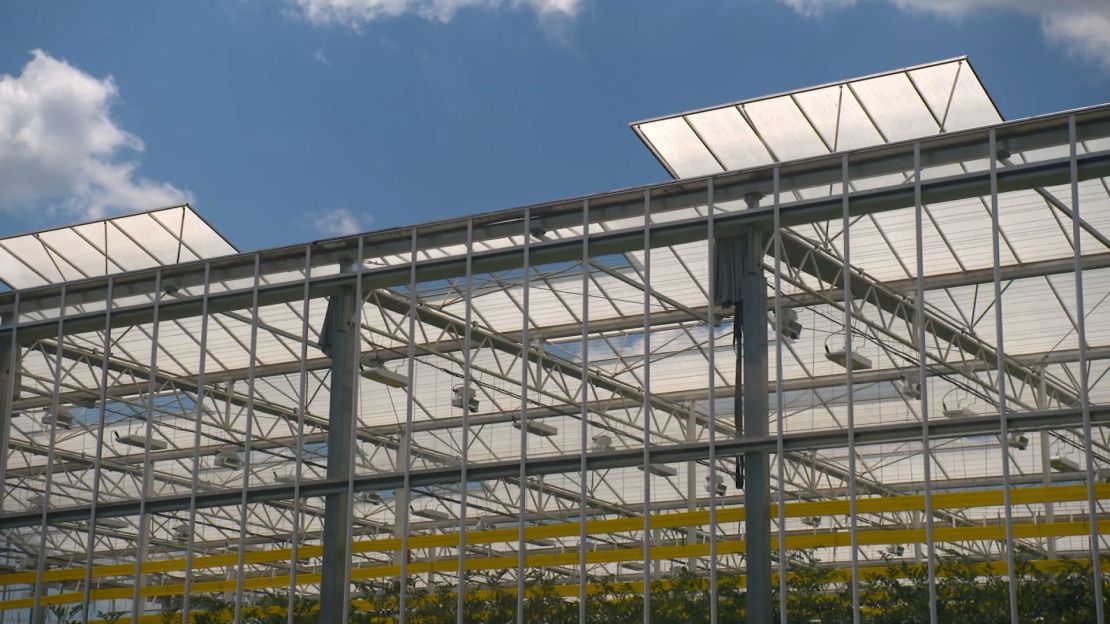As a venture capitalist, JD Vance repeatedly touted his guiding principles for investing in a company: A business should not only turn a profit, it should also help American communities.
That’s why, he said, he invested in AppHarvest, a startup that promised a high-tech future for farming and for the workers of Eastern Kentucky. Over a four-year span, Vance was an early investor, board member and public pitchman for the indoor-agriculture company.
“It’s not just a good investment opportunity, it’s a great business that’s making a big difference in the world,” Vance proclaimed in a Fox Business interview on the day the company went public in February 2021.
Last year, facing hundreds of millions of dollars in debt, AppHarvest declared bankruptcy.
The rise and fall of the company, and Vance’s role in it, cuts against his image as a champion for the working class — an image that helped catapult him to the top of the Republican ticket as Donald Trump’s running mate.
A CNN review of public documents, and interviews with a dozen former workers, shows that AppHarvest not only failed as a business after pursuing rapid growth, but also provided a grim job experience for many of the working-class Kentuckians Vance has vowed to help.
AppHarvest employees said they were forced to work in grueling conditions inside the company’s greenhouse, where temperatures often soared into the triple digits. Complaints filed with the US Department of Labor and a Kentucky regulator between 2020 and 2023 show that workers alleged they were given insufficient water breaks and weren’t provided adequate safety gear. Some workers said they suffered heat exhaustion or injuries, though state inspectors did not find violations.
Despite promising local jobs, the company eventually began contracting migrant workers from Mexico, Guatemala and other countries, numerous former employees told CNN.
While Vance stepped down from AppHarvest’s board and launched his political career in 2021, he remained an investor and supporter of the company. By the time he was sworn in to office last year, the company he’d hailed as a great opportunity was mired in lawsuits filed by shareholders angry over its plummeting stock price and allegations of fraud.
Several former employees told CNN they thought Vance and other board members should have recognized and responded to warning signs that company officials were misleading the public and their own investors.
To some, Vance’s enthusiastic promotion of the company followed an all-too-familiar story line in the region.
“Eastern Kentucky is well-known for people coming and going. They start up companies, then they disappear,” said former AppHarvest worker Anthony Morgan. “They didn’t care about us.”
A spokesperson for Vance, Luke Schroeder, said in a statement that the Ohio senator “was not aware of the operational decisions regarding hiring, employee benefits, or other workplace policies which were made after he departed AppHarvest’s board. Like all early supporters, JD believed in AppHarvest’s mission and wishes the company would have succeeded.”
Early investor

With the blockbuster success of his 2016 memoir “Hillbilly Elegy,” Vance was riding high. He had learned how to invest in startups in Silicon Valley, where he worked at PayPal co-founder Peter Thiel’s firm. Thiel would later bankroll Vance’s own VC fund and Ohio senatorial run.
AOL co-founder Steve Case hired Vance in 2017 to expand his seed fund Rise of the Rest, which sought to invest in underserved markets. Vance, whose book aimed to explain the plight of America’s forgotten heartland, seemed like the perfect fit.
After about a week on the job, Vance took a meeting with AppHarvest founder Jonathan Webb, as Webb later recounted in a Fox News podcast interview. Webb, a Kentucky native, had created the company because he saw in his state the potential to build an indoor vertical farming hub growing fruits and vegetables, one that was within a day’s drive of most of the US population, and where water and land were abundant.
But he needed money and was running out of time.
Webb had drained his savings and maxed out his credit cards running AppHarvest. As he told Fox News, Webb convinced Vance “to write a $150,000 check” to invest in AppHarvest, alongside a few other investors, who invested $50,000 each.
Vance was named to the board of directors in March 2017, according to his Senate disclosures, though company security filings stated that he joined in 2020.
When Vance opened his own Ohio-based VC firm, Narya, with $93 million in funds, one of its earliest publicly disclosed investments was in AppHarvest. In just a few years, Vance helped steer millions of dollars in capital to the company and proved himself an invaluable asset to Webb as a pitchman.
‘Talk of the town’
Back in Kentucky, Anthony Morgan left his job at a local automobile parts plant in October 2020 to join AppHarvest as a crop care specialist, pruning tomatoes at the company’s new 60-acre mega greenhouse in the Eastern Kentucky city of Morehead.
The company’s health care benefits attracted Morgan, a single father, who told CNN he took a pay cut to join the startup. He was also drawn to the larger promise that Webb sold in frequent interviews in the media: a company committed to Appalachia.
“AppHarvest was the talk of the town,” Morgan said. “A major emphasis with them was ‘we want to bring work to Eastern Kentucky. This is why we are here.’”

The company had pledged thousands of jobs for “high unemployment areas,” according to a 2020 investor presentation. Much of Eastern Kentucky at the time had been designated as economically distressed.
Things started out well, Morgan said. The hours were manageable, and the benefits were better than anything he could hope to get from other employers in the area. Then, a few months in, Morgan recounted a noticeable shift in the company’s culture.
Production fell behind and workers got the message that they needed to pick up the pace, Morgan said. The company cut costs, including the employer-paid health care benefits, and managers were tasked with meeting far higher production quotas. That meant longer hours for workers and fewer breaks in the brutal heat of the greenhouse.
“I think about the hottest that I experienced was around 128 degrees,” Morgan said. “A couple days a week, you’d have an ambulance show up and you seen people leaving on gurneys to go to the hospital.”
The conditions became intolerable, and employees began to leave the company in droves, several workers told CNN. Morgan helped organize an employee sit-in to demand fairer working conditions, and said that he was fired after he took time off for medical care for an injury he said he suffered on the job.
“It was a nightmare that should have never happened,” Morgan said of his experience overall.
Brutal working conditions
Shelby Hester, another crop care specialist, started at AppHarvest in 2021. A recent graduate of nearby Morehead State University, she had been working at a liquor store.
Like Morgan, AppHarvest’s lofty and progressive messaging appealed to Hester. She believed the company could “take me somewhere in life.” A CNN story that year suggested the company offered a vision for the future of sustainable farming.
Hester’s main responsibility was harvesting the tomatoes right off the vine. She excelled, despite the excessive heat and demanding quotas. Workers, she said, were not provided adequate protection.
“I had to bring in my own N95 masks, because I was getting sick from the amount of mold and just nasty stuff that was in there,” Hester told CNN.
It was the heat, though, that took a toll. Hester echoed Morgan’s account that workers were routinely taken out of the greenhouse by medical personnel because they were suffering from heat stroke symptoms. Those who went to the doctor, she said, were told by managers that a doctor’s note was not a sufficient reason to miss a shift.
On at least three occasions, state government inspectors visited AppHarvest facilities but issued no citations, documents show. Inspectors noted that they observed or heard about safety precautions during their visits, such as mandatory heat breaks and drinks offered to employees.
A spokesperson for Kentucky’s Education and Labor Cabinet said inspections revealed no violations of national guidelines recommended to protect employees from heat-related illnesses, including regular access to fresh drinking water, rest breaks and opportunities to escape high temperatures.
Still, some former workers argue the conditions were at times unsafe. Allegations of harsh working environments were detailed in a report published last year by Grist and the Kentucky Center for Investigative Reporting.
The company also struggled with what multiple workers described as mismanagement.
“There was really no direction,” said Andrew Miller, another former crop care specialist at AppHarvest, who described the company training as “just figure it out as you go.”
Another worker described the training as more ideologically driven than focused on the practical day-to-day tasks of doing the job.
“We watched a movie narrated by David Attenborough, the famous, older environmentalist,” said one former worker named Bethany, who asked that CNN use only her first name. “But we didn’t talk about how to use the scissor lifts or what was happening our first day.”
Asked for comment, the company’s chief restructuring officer, Gary Broadbent, wrote to CNN, “AppHarvest has no continuing operations and is not in a position to respond.”
‘Contract laborers’
As workers left, AppHarvest replaced them with migrant workers, numerous former employees told CNN. By the early fall of 2021, Hester described a workforce that was made up of many workers from countries such as Mexico and Guatemala.
That juxtaposition with the company’s public messaging on jobs was on full display when Senate Minority Leader Mitch McConnell, a Kentucky Republican, toured the greenhouse that November.
“They brought Mitch McConnell into the greenhouse, and they sent every single Hispanic worker home before he got there,” Hester said. “He then proceeded to have a speech about how we were taking the jobs from the Mexicans.” At least five workers confirmed Hester’s account of McConnell’s visit to CNN.
Supporting other worker accounts, Hester’s husband, Mitch Smith, who also worked at AppHarvest, told CNN that the migrants were kept in separate bays from other workers and were sent away when bigwigs came through the warehouse.

AppHarvest acknowledged the hiring of “contract laborers” in its 2021 annual report to the Securities and Exchange Commission. “In order to forestall any potential labor shortfall, we have hired contract laborers from outside of the region to help complete our next harvest,” the filing stated. A filing for the following year stated the company had about 500 full-time employees and 414 independent contractors.
A campaign representative for Vance forwarded a statement from a member of AppHarvest’s senior management team who participated in meetings of the company’s board of directors.
The senior manager, who requested anonymity to discuss confidential exchanges, said, “The allegations made against AppHarvest do not reflect matters discussed at board meetings during JD’s tenure — for obvious reasons. AppHarvest implemented robust heat policies when temperatures rose in the summer, months after JD’s departure, continued to cover 100% of employees’ health insurance premiums until mid-2022, and maintained a workforce dedicated to Appalachia throughout its existence.”
The downfall
On the day AppHarvest went public in February 2021, its shares jumped so high that trading in the stock was briefly halted due to volatility. With a total valuation of more than $1 billion, the company’s growth had been meteoric, propelled by millions of venture capital cash, some star power — Martha Stewart was on the board — and a compelling story.
But it would all soon fall apart.
That August, AppHarvest reported a $32 million loss in its second quarter, citing lower market costs for tomatoes and worker training issues. AppHarvest lost more than three-quarters of its value in its first six months as a public company.
The next month came the first shareholder lawsuit. By August 2022, the company was fighting multiple lawsuits. Some alleged executives, including Webb, had misled regulators and investors by overstating the company’s hiring and retention figures. One suit filed by the Plymouth County Retirement Association, a pension fund for employees like firefighters, bus drivers and custodians in Massachusetts, alleged AppHarvest made “false and/or misleading statements” to artificially boost its share price.
AppHarvest executives denied the claims and reached a multimillion-dollar settlement with investors this year.
Vance was not named in any of the lawsuits. He left the company’s board in April 2021 and ran for the Senate, though at that time he still had more than $100,000 invested in the company, according to disclosures. His VC firm, Narya, also continued to express public support for the company.
AppHarvest filed for bankruptcy last year, weighed down by more than $341 million in debt. In a court filing, Broadbent stated the company had experienced a “significant liquidity crisis” due to lower-than-expected crop yields, “higher-than-expected costs, and tightening of the equity markets and declining stock prices.”
A Canada-based company bought or acquired leases for some of AppHarvest’s greenhouses.
On the campaign trail this summer, Vance has promoted an agenda of economic prosperity. During his speech at the Republican National Convention, he talked about his personal record of starting businesses “to create jobs in the kinds of places that I grew up in” and what he called the need to “stand up for” American businesses.
Such comments ring hollow to some former AppHarvest workers, who argue Vance’s rhetoric as a candidate for vice president doesn’t align with the reality they experienced.
“Making the decision to go to work at AppHarvest, like many of us made, the livelihood just went right down the drain,” Morgan said. “I blame all of the original investors.”
